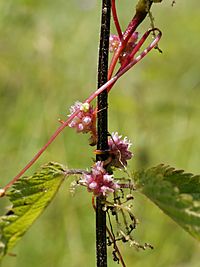Old River Severn, Upper Lode facts for kids
| Site of Special Scientific Interest | |

Greater dodder on nettle
|
|
| Area of Search | Gloucestershire |
|---|---|
| Coordinates | 51°59′48″N 2°10′32″W / 51.996664°N 2.175462°W |
| Interest | Biological |
| Area | 3.72 hectare |
| Notification | 1985 |
The Old River Severn, Upper Lode is a special natural area in Gloucestershire, England. It's officially known as a biological Site of Special Scientific Interest (SSSI). This means it's a protected place because of its unique plants and animals. It covers about 3.72 hectares, which is roughly the size of five football fields. This important site was first recognized in 1985. It even stretches across the borders of Gloucestershire, Herefordshire, and Worcestershire.
Contents
Discovering the Old River Severn's Location
This special area is part of the River Severn, one of Britain's longest rivers. It's actually an old bend, or "meander," of the river. This part was cut off from the main flow when a lock called Upper Lode was built. Because it's now a quiet backwater, it's a peaceful home for many creatures. It eventually rejoins the main River Severn at its southern end.
Amazing Plants and Habitats
The quiet waters of the Old River Severn, Upper Lode, support many different types of natural homes, called habitats. These habitats help a wide variety of plants to grow. There are even at least six types of plants here that are considered nationally rare!
Over time, the part of the channel furthest from the main river has filled up with silt, which is like fine mud. In some places, old soil and waste were dumped, creating areas of rough grassland.
The different habitats you can find here include:
- Open water areas
- Muddy edges along the water
- Inland saltmarsh, which is rare for an inland area
- Willow carr, a type of wet woodland with willow trees
- Neutral grassland, a common type of meadow
- Scrub, areas with bushes and small trees
- Woodland, with larger trees
The water level in this old river bend changes with the main River Severn. This is because the Severn is a tidal river, meaning its water levels go up and down with the ocean tides.
Water Plants and Trees
Many interesting water plants thrive here. You can find different types of pondweed, flowering rush, water forget-me-not, water-cress, and water dock.
Trees like white willow, crack willow, and osier grow along the banks. In the rough grassland areas, you might spot the nationally rare swamp meadow grass. The woodlands are home to trees like alder and ash, along with more willows.
Rare and Special Plants
This site is very important because it supports several nationally rare plant species. These include:
- Greater dodder: This unique plant is a parasite, meaning it grows on other plants like nettles to get its food.
- Tasteless water-pepper
- Small water pepper
- Mudwort
- Needle spike rush
The Old River Severn, Upper Lode, is the only known place in Gloucestershire where you can find small water pepper, mudwort, and needle spike rush. Other special plants recorded here include narrow-leaved water plantain, keeled garlic (Allium carinatus), glaucous bulrush (Schoenoplectus tabernaemontani), and sea club rush (Scirpus maritimus).
Wildlife of the Old River Severn
This peaceful backwater is a haven for many animals, especially birds and insects.
Birds
You can often see birds like mallards and coot swimming on the water. In the reeds and bushes, you might hear the songs of Eurasian reed warblers and sedge warblers. Kingfishers, with their bright blue and orange feathers, are also present.
Wading birds, which are birds with long legs that walk in shallow water, are also reported here. These include redshank, common sandpiper, and lapwing.
Insects
Dragonflies are a common sight, darting over the water. The site is home to some less common species, such as the hawker dragonfly and the white-legged damselfly.

